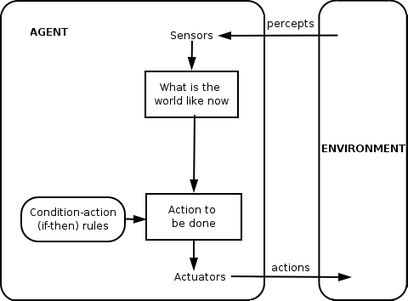In intelligence and artificial intelligence, an intelligent agent (IA) is an agent that perceives its environment, takes actions autonomously in order to achieve goals, and may improve its performance with learning or acquiring knowledge.
An intelligent agent may be simple or complex: A thermostat or other control system is considered an example of an intelligent agent, as is a human being, as is any system that meets the definition, such as a firm, a state, or a biome.[1]

Leading AI textbooks define "artificial intelligence" as the "study and design of intelligent agents", a definition that considers goal-directed behavior to be the essence of intelligence. Goal-directed agents are also described using a term borrowed from economics, "rational agent".[1]
An agent has an "objective function" that encapsulates all the IA's goals. Such an agent is designed to create and execute whatever plan will, upon completion, maximize the expected value of the objective function.[2]
For example, a reinforcement learning agent has a "reward function" that allows the programmers to shape the IA's desired behavior,[3] and an evolutionary algorithm's behavior is shaped by a "fitness function".[4]
Intelligent agents in artificial intelligence are closely related to agents in economics, and versions of the intelligent agent paradigm are studied in cognitive science, ethics, and the philosophy of practical reason, as well as in many interdisciplinary socio-cognitive modeling and computer social simulations.
Intelligent agents are often described schematically as an abstract functional system similar to a computer program.
Abstract descriptions of intelligent agents are called abstract intelligent agents (AIA) to distinguish them from their real-world implementations.
An autonomous intelligent agent is designed to function in the absence of human intervention. Intelligent agents are also closely related to software agents. An autonomous computer program that carries out tasks on behalf of users.
- ^ a b Russell & Norvig 2003, chpt. 2.
- ^ Bringsjord, Selmer; Govindarajulu, Naveen Sundar (12 July 2018). "Artificial Intelligence". In Edward N. Zalta (ed.). The Stanford Encyclopedia of Philosophy (Summer 2020 Edition).
- ^ Wolchover, Natalie (30 January 2020). "Artificial Intelligence Will Do What We Ask. That's a Problem". Quanta Magazine. Retrieved 21 June 2020.
- ^ Bull, Larry (1999). "On model-based evolutionary computation". Soft Computing. 3 (2): 76–82. doi:10.1007/s005000050055. S2CID 9699920.